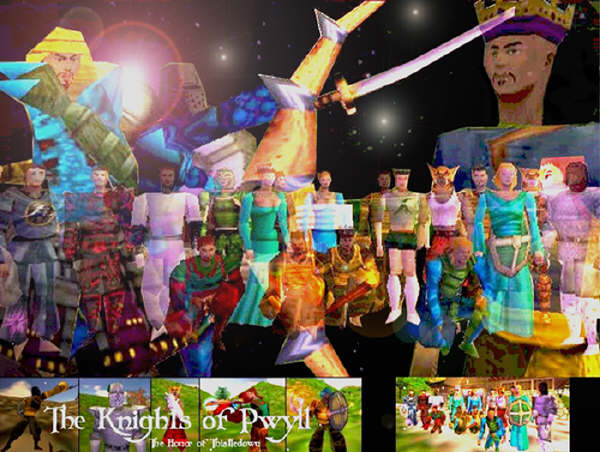
You’d think recent news about Asheron’s Call 1 and AC2 would be easy to swallow. After all, we’d already been warned that Turbine was becoming a mobile company. We lived through the end of AC1 updates and a desire to give players the chance to host their own servers. Heck, AC2 had died and resurrected. We’ve been living on borrowed time, but anything seemed possible. Despite the fact that Turbine’s games were squeaking by (when not getting cancelled), I thought that fan power would lead the company to see what it’d done right (innovating MMOs) and where it had failed (straying from monthly updates and GM lead content).
Clearly I was wrong.
The revolution
People often ask what was so great about the Asheron’s Call series — it was early, and most modern MMORPG players missed out on the game entirely. Although the sequel gets a lot of flak, there are some key ingredients that bind them together:
- A social pyramid scheme created specifically to encourage veteran players to help new players
- Monthly content updates frequently with events (eventually bi-monthly)
- GM led but player driven events, such as the Shard of the Herald event
- Optional, tier-based PvP
- Original lore built on world mythology and history
- No instancing
Now, that doesn’t look like much, but those are things modern MMOs still largely miss the mark on. For example, the allegiance system, where players swear fealty to each other, gave high levels a reason to seek new players. New players gave the person they swore allegiance to experience without losing any themselves, and this in turn would be passed up from the bottom of the pyramid to the top. It wasn’t perfect, and there was still ganking of lowbies, but what system is? Imagine how much the survival genre would change if, say, players who swore loyalty to another passed up a portion of their supplies to leadership’s storage area automatically: Suddenly newbies entering the game aren’t just easy fodder for a gank but a potential positive resource.
The monthly updates made subscription fees, well, make sense. You weren’t just getting access to a digital Disneyland but to new rides and attractions. I remember months after World of Warcraft’s launch wondering why I had to pay a monthly sub when I wasn’t getting any new content. Yes, the game launched with a good amount, but AC1, AC2, and even Istaria (then called Horizons) did it. That, combined with Game Masters taking over lore characters and interacting with normal players, made the game feel truly alive. Revival planned to do something similar, but sadly it’s been cancelled with only a possibility of returning.
PvP is a hot topic, so I’ll stay light on this, but the Shard of the Herald event the game is so famous for was in fact a PvP scenario. What’s important to note, however, is that it was optional. Non-PvP flagged players (like me at the time) could do things to help the effort. Later, Turbine would add a “PK-Lite” option to AC, while AC2 was largely PvE. While AC2 did initially force players to sometimes run through PvP territory, this was later changed. Again, the system wasn’t perfect, but as someone who was involved in that community and other PvP communities, I can say that it had some of the easiest issues to manage. This was a big change from Ultima Online’s rampant PK launch state and EverQuest’s token PvP server bunt.
Game lore, while probably a lesser advertised feature, has its uses. As a kid with a parent who tolerated games but constantly questioned anything beyond puzzlers or kart racers, I always had to prove the value of my hobby. Chris “Stormwaltz” L’Etoile (whom you’ll recognize as a commenter here on Massively OP), wrote a ton of the early lore, combining so much real-world culture, language, and mythology that I spent summers from middle school to college investigating some of the games’ inspiration with the help of the local library and internet. I frequently had the highest grade in the class in my high school mythology class despite being one of the youngest students because of Stormwaltz’s creative but logical inclusion of reality. When my eccentric, old fashioned teacher found out my “secret,” she was silent for a moment (a very rare thing) before admitting that if games could help me learn mythology, they couldn’t be all bad.
Finally, non-instancing. While I feel modern gaming may need this in some sense unless the whole world is procedurally generated, it can be heavy handed, and Turbine was one of the first MMO studios to do this. Non-instanced dungeons could be swarmed and the battle “narration” lost, but it also helped make it easier to stumble upon friendly help.
Still other gamers will point to AC1’s lack of classes, spell economy, and Darktide in general. There’s no shortage of reasons to appreciate this franchise — I’ve only scratched the surface here.
Evil empire
Unfortunately, Turbine’s always paired up with not-so-great partners. Microsoft rushed AC2 out the door with a broken chat system (among other issues), which honestly caused the game a lot of its early woes. While a lot of people complain about factors such as class trees, the fact that the game had a lot of quests to help you level (rather than requiring players to grind monsters – and long before World of Warcraft did it) also frustrated gamers. Players who returned to AC1 often missed basic differences (basic trees often allowed for unique hybrid specs, like tank-archer-healers), and their arguments to me would end with, “Well, if the chat system had worked, maybe someone could have told me that.”
Getting access to IPs like Dungeons and Dragons and Lord of the Rings may have brought Turbine money, but it also stifled creativity. When you work with someone else’s IP, you play by his rules. And while I’m sure teaming up with Warner Brothers has helped Turbine financially through the years, changing it into a mobile company is a bad move for Turbine. The current official site has one launched game, one in development game, and the remains of Asheron’s Call, which as we know isn’t long for this world. I don’t hear anyone talking about their Batman game, and Infinite Crisis — well, Eliot made some good points about it before it shut down. The business decisions haven’t been good ones.
Failing fans
Hindsight is 20/20. Maybe looking back, the Turbine heads could see where the genre was changing. Maybe that’s why some of them have been jumping ship for awhile. Jeremy Gaffney left early to move on to EA and NCSoft before his stint at Carbine. Johnny Monsarrat, who founded the company with the help of a personal injury payment, went on to some fancy schools before making his own consulting company. David Bowman left to work on Istaria before the name change and now works for TellTale Games, one of my favorite game companies. While it’s a bit complicated, both Eric Heimburg and Sandra Powers of Project Gorgon have… aw hell, you see how much the MOP team loves what those two are experimenting with. My point is, they all had their own talents and have left a mark on the industry, but it seems their spirit left with them.
While Turbine may still have some good people there, and now splitting off to Standing Stone, it’s hard not to take their recent history personally as a fan. When we first broke news of AC no longer getting patches, we, along with the rest of the industry (and then some) gave the studio kudos for wanting to hand the game off to the players. It seems we were too generous, too trusting, because that isn’t happening now.
The rational side of me says that something happened. Maybe someone else owns the rights to something Turbine can’t hand over. Perhaps there’s a legal issue Turbine’s lawyers can’t kill off without keeping the company liable even if they aren’t officially running the game. Heck, for all I know, someone accidentally deleted key code while trying to pass data to the new company, then coffee was spilled on the machine holding that data and a hamster, having learned to make fire, then burned down a key building holding the backup data. There really could be an explanation as to why Turbine isn’t following through on this.
Realistically, many fans have moved on. I barely have touched either game myself after the revival, in part because the monthly updates and GM events stopped. I did, however, try to keep up with the lore and the community. Across other games, I actually bumped into not only other AC fans but even players I once fought against (hey Crags!). The series is more than just another game; they’re virtual worlds we were part of: We lived in Dereth, had homes on it, had ancestors remembered on its pillars, maybe even had major lore characters speak our names, ask us to swear to them, or even bow to us. It wasn’t just roleplay; it was virtual living.
If what’s left of Turbine (and the former Turbine people now at Standing Stone) really wanted to make this right, they’d try to open up more to us. Hint better at what’s really going on. Hint that anyone who wanted to carry on the torch could do so without worrying about lawsuits. Hint that they’re going to try to build something with their new mobile emphasis (take my idea and make it less crazy). Just give us more hope than producing another company’s lame IP-based mobile game. Asheron’s Call is what Turbine started with. It’s what attracted many of us to it as a company. If this is the end of its MMO days, giving AC to the fans is what it should end with.
 Everyone has opinions, and The Soapbox is how we indulge ours. Join the Massively OP writers as we take turns atop our very own soapbox to deliver unfettered editorials a bit outside our normal purviews (and not necessarily shared across the staff). Think we’re spot on — or out of our minds? Let us know in the comments!
Everyone has opinions, and The Soapbox is how we indulge ours. Join the Massively OP writers as we take turns atop our very own soapbox to deliver unfettered editorials a bit outside our normal purviews (and not necessarily shared across the staff). Think we’re spot on — or out of our minds? Let us know in the comments!
















